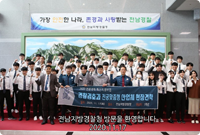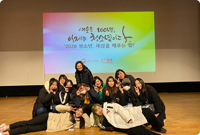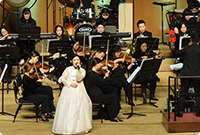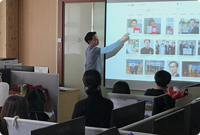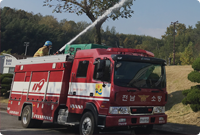
Firefighting and
Safety Management
|
With rapid changes in society driven by globalization, information, and regionalization, defense against fire and other natural disasters have become a work of paramount importance in the protection of people’s lives and properties as well as public order. To that end, firefighting activities have emerged from their focus on fire prevention and relief to encompass other work as well, such as national disaster response, emergency rescue, and even some areas of social welfare, which are expected to drive the demand for qualified firefighters even further in future. Thus, this program offers training based on systematic and scientific theory, field-oriented knowledge, and expertise not only in firefighting but also in industrial safety, design of firefighting facilities, management, services, and inspection. |

New Renewable
Energy and Electricity
|
New Renewable Energy and Electricity is an NCS-based curriculum that works together with the national Naju Energy Valley project. It is implemented in an industry-academic cooperative campus that is designed to offer a qualified workforce and system to KEPCO and other energy firms with a special focus on the convergence of advanced digital and information technologies. This industry-academic field-oriented expert training program offers specialized training for employment in various automated electric automation, electronic application, and other industrial fields. The program also integrates a cooperative arrangement with the Naju Energy Valley project, which seeks to equip the students with field-oriented, demand-driven skills that will guarantee employment in industrial organizations after their graduation. Other elements of the program include the faculty supervision system, which offers personalized instructions for all students, and license acquisition programs that aim to help students earn at least one national certification in the field of renewable energy and electricity. |
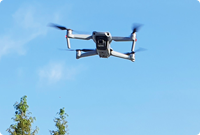
Drones and
Mechanics
|
Drones are one of the centerpieces of Korea’s new growth driver project, as a next-generation transportation system established strategically for many municipal and regional authorities. As such, this department focuses on training expert drone operators who combine creativity with mechanical excellence in drone operation, design, production, maintenance, software, survey, and aerial photography centered around regional service. The mechanics part of the program uses cutting-edge technology, such as sensors, artificial intelligence (AI), robotics, and other mechanical disciplines.
Based on a social demand-driven curriculum, the program operates agreements, employment plans, and industry-academic cooperation training to guarantee the employment of the graduates in industrial sectors, while the municipal-university innovation project directly connects the graduates of the program with the strategic programs of the region. The curriculum is based on the National Competency Standards (NCS) program, which offers a core infrastructure for the training of field-oriented experts.
|

Public Engineering and Environment
(daytime, nighttime)
|
Public and environmental engineering is a field that seeks to preserve the natural environment while developing the land for human use, including theories and technology required for the planning, design, construction, and management of social infrastructure.
The public engineering portion of this program focuses on the operation of social infrastructure facilities, such as roads, railways, bridges, dams, airports and seaports, waterworks, and water resources, with equal focus on theory and practical knowledge.
Furthermore, the environment portion of this program focuses on expert knowledge and technology related to water and air quality, waste disposal, noise and vibration, and other issues concerning the environment and their effective resolution.
|
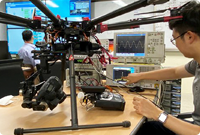
Artificial Intelligence
(AI) and Drones
|
This program focuses on the emerging fields of the Fourth Industrial Revolution, from the Internet of Things (IoT), AI, and Big Data to other information and communications technology (ICT) fields and convergence. It offers an NCS-based program that encompasses the entire field of cutting-edge industry, from AI and drones to autonomous driving, AR/VR, smart factories, and robotics. In addition, it makes use of the state-funded Naju Energy Valley campus to integrate a strong element of industry-academic cooperation in its program, expanding the opportunities of employment for students and offering field-oriented education with work-and-learn programs. |
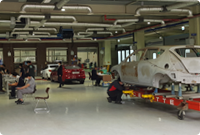
Future Automobile
|
The automobile industry is undergoing an unprecedented change in future forms, as seen in environmentally friendly, autonomous vehicles. This gives rise to the need for quality workers in entry-level management and skilled production.
To that end, this department offers NCS-based corporate and field training on the production, maintenance, and development of electric and autonomous vehicles and their components. An integrated curriculum of automotive engineering seeks to train students who will be equipped with the required skills for mid-level technological posts in a corporate environment.
This department offers “regional innovation platform” and “Off-JT (OJT)” programs.
- Regional innovation platform: This is a five-year regional specialization program involving a yearly budget of KRW 60 billion that seeks to train regional and specialized talents for the strategic goals of Gwangju and South Jeolla regions, fostering the mutual growth of the region and university through municipal-academic cooperative agreements specialized on future mobility and other fields.
- Off-JT (OJT) program: This program is a pilot program offered by three universities across Korea, with Jeonnam Provincial College being the only university offering this program in Gwangju-South Jeolla region. It consists of sophomore-level students engaging in work-and-learn arrangements with 13 automobile maintenance companies, including Hyundai Motor Company, Kia Motors, Renault Samsung Motors, and GM Korea, for a field-oriented training program brought together through industry-academic cooperation under the sponsorship of the Ministry of Employment and Labor.
This program offers various benefits for the participants, including full tuition support for the sophomore year, eligibility for the national scholarship program, monthly trainee wages (approximately KRW 400,000 and above), equipment support, and employment guarantee at the training site.
|
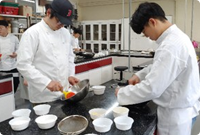
Food and Biological Science
|
1. The Department of Food and Biological Science is grounded in the utmost necessity of human happiness—food. It focuses on developing new growth drivers in bio and food industries, the development of the sixth industry, and field-oriented training required for food processing, production, and quality management of food materials.
2. The department has been reorganized as a specialization program to reflect the demands of the Korean food industry, focusing on the training of skilled experts in the production and processing of nutritious foods as well as food quality management.
3. The goal of the program is to train skilled experts who are not only equipped with holistic knowledge on food processing and quality management, and capable of playing a central role in the development of the food industry and bioengineering, but also instilled with character for community service.
|
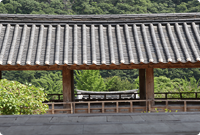
Hanok Architecture
|
Hanok refers to the traditional forms of Korean domicile. The program aspires to train field-oriented experts who can skillfully combine traditional building techniques with modern spatial design so that they can respond flexibly and proactively to the changing trends of the cultural content industry.
1. The goal is to train specialists who are firmly rooted in the style and aesthetics of Korean hanok yet able to showcase the diversity of the art form while preserving the cultural heritage and reinterpreting them for modernity.
2. The standardization, regionalization, and industrialization of the hanok cultural content will help create employment and additional value for the community and the industry.
3. This architectural program focuses on the construction and design of hanok, with the goal of training specialists in cultural heritage maintenance.
|

